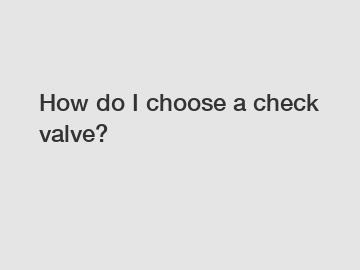How do I choose a check valve?
Check valves play a critical role in various industries, ensuring the seamless, one-way flow of fluids or gases. Whether you're in the plumbing, manufacturing, or oil and gas sector, selecting the right check valve is paramount to the efficiency and safety of your operations. With so many options available, it's easy to feel overwhelmed. But fear not! In this blog post, we will guide you through the essential considerations for choosing the perfect check valve, helping you make an informed decision tailored to your specific needs.
1. Understand your Application:
To begin your search for the ideal check valve, it's crucial to have a thorough understanding of your application's requirements. Consider factors such as the type of fluid or gas, flow rate, pressure, temperature, and potential contaminants. Assessing these parameters will help you determine the necessary valve type, materials, and design features required to achieve optimal performance.

2. Select the Appropriate Valve Type:
The next step is to identify the most suitable check valve type for your application. Here are a few commonly used options:
a) Swing Check Valve: Ideal for applications with low flow rates and relatively low-pressure drops, swing check valves feature a hinged disc that swings open to allow flow in one direction. They are commonly used in wastewater treatment plants and residential plumbing systems.
b) Wafer Check Valve: Designed for applications where space is limited, wafer check valves are lightweight and compact. They provide effective flow control in various industries, including pharmaceuticals, food processing, and HVAC systems.
c) Lift Check Valve: Suitable for high-pressure applications, lift check valves use a piston-like structure to lift and allow fluid flow when the pressure differential is within the specified range. These valves are commonly found in chemical processing plants and power generation facilities.
d) Diaphragm Check Valve: Ideally suited for highly corrosive fluids or gases, diaphragm check valves use a flexible diaphragm to control flow. They are widely used in the chemical industry, petrochemical refineries, and medical applications.
3. Material Selection:
The choice of materials is vital to ensure the valve's longevity and compatibility with the fluid or gas being controlled. Consider factors such as chemical compatibility, temperature resistance, and durability when selecting the valve's construction materials. Common materials include stainless steel, cast iron, PVC, brass, and various exotic alloys. Consult with experts or refer to industry standards to determine the appropriate material for your specific application.
4. Valve Sizing and Pressure Drop:
Proper sizing of the check valve is crucial to prevent excessive pressure drops or backflow issues. Consider factors such as flow rate, line size, and system pressure when determining the valve size. It is recommended to consult with engineers or refer to specific sizing charts to ensure accurate valve selection.
5. Additional Features:
Depending on your application's unique requirements, you may want to consider additional features that enhance the valve's performance. These features may include anti-cavitation trim, noise reduction mechanisms, or built-in backflow prevention devices. It is important to assess such requirements and seek expert advice to identify the most appropriate features for optimized operations.
Conclusion:
Choosing the right check valve is an essential step towards ensuring efficient fluid or gas flow, preventing backflow, and maintaining the overall integrity of your system. By understanding your application, selecting the appropriate valve type, considering the material compatibility, and accounting for additional features, you can make an informed decision suited to your specific needs. Consult with industry experts, manufacturers, and follow established standards to ensure maximum safety and efficiency in your operations. With the right check valve in place, you can enjoy smooth and hassle-free operations while ensuring the reliability and longevity of your system.
For more wholesale Hydraulic Control Check Valve Supplier, Applications of proportional valve for water, wholesale one way hydraulic check valveinformation, please contact us. We will provide professional answers.

Comments
0